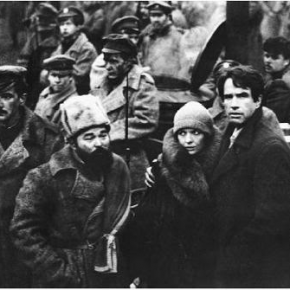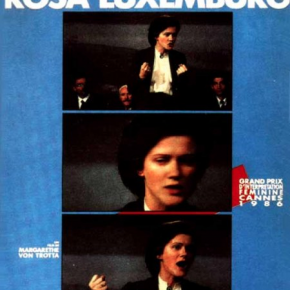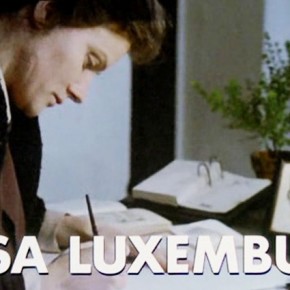Summer 2017 readings: Lenin and the 1917 Russian Revolution
- required/ + recommended reading
- Lenin readings available in Robert C. Tucker, ed., The Lenin Anthology (Norton, 1977), except (*) on marxists.org
Recommended background readings
+ Richard Appignanesi and Oscar Zarate / A&Z, Introducing Lenin and the Russian Revolution / Lenin for Beginners (1977)
+ John Reed, Ten Days that Shook the World (1919)
Week 1 | June 19
- Vladimir Ilyich Lenin, Two Tactics of Social Democracy in the Democratic Revolution(1905)
- Lenin, On the Two Lines in the Revolution(1915) *
Week 2 | June 26
- Lenin, Lecture on the 1905 Revolution(1917)
- Lenin, Letters from Afar (1917) *
- Lenin, April Theses (1917)
Week 4 | July 10
- Lenin, The Dual Power(1917)
- Lenin, The Enemies of the People (1917)
- Lenin, The Beginning of Bonapartism (1917)
Week 5 | July 17
- Lenin, Can the Bolsheviks Retain State Power?(1917)
- Lenin, Marxism and Insurrection (1917)
- Lenin, Advice of an Onlooker (1917)
Week 6 | July 24
- Lenin, To the Citizens of Russia!(1917)
- Lenin, Theses on the Constituent Assembly (1917)
- Lenin, The Chief Task of Our Day (1918)
- Lenin, The Immediate Tasks of the Soviet Government (1918)
Week 7 | July 31
- Lenin, The Proletarian Revolution and the Renegade Kautsky(1918)
Join us for discussion on contemporary political issues, and articles from the Platypus Reviews.
Mondays 6pm, Think Coffee 248 Mercer St, New York (by NYU)
Reading Group, Tuesdays 7pm, 19 University Place Room 337
Recommended winter break preliminary readings:
+ Leszek Kolakowski, “The concept of the Left” (1968)
+ Richard Appignanesi and Oscar Zarate / A&Z, Introducing Lenin and the Russian Revolution / Lenin for Beginners (1977)
+ Sebastian Haffner, Failure of a Revolution: Germany 1918–19 (1968)
+ Tariq Ali and Phil Evans, Introducing Trotsky and Marxism / Trotsky for Beginners (1980)
+ James Joll, The Second International 1889–1914 (1966)
+ Edmund Wilson, To the Finland Station: A Study in the Writing and Acting of History (1940), Part II. Ch. (1–4,) 5–10, 12–16; Part III. Ch. 1–6
Film screenings: January 2017
- 37 Days(2014) [Episode 1] [Episode 2] [Episode 3]
- Fall of Eagles (1974) episodes: "Absolute Beginners," "The Secret War," and "End Game"
- Rosa Luxemburg (1986)
- Oliver Stone's Untold History of the United States (2012) Episodes A (1900-20) and B (1920-40)
- Reds (1981)
Week 13. Revolutionary leadership | Jan. 30, 2017
- Rosa Luxemburg, “The Crisis of German Social Democracy” Part 1 (1915)
- J. P. Nettl, “The German Social Democratic Party 1890–1914 as a Political Model” (1965)
- Cliff Slaughter, “What is Revolutionary Leadership?” (1960)
Week 14. Reform or revolution? | Feb. 6, 2017
- Luxemburg, Reform or Revolution? (1900/08)
Week 15. Lenin and the vanguard party | Feb. 13, 2017
- Spartacist League, Lenin and the Vanguard Party (1978)
Week 16. What is to be done? | Feb. 20, 2017
- V. I. Lenin, What is to be Done? (1902)
- + Richard Appignanesi and Oscar Zarate / A&Z, Introducing Lenin and the Russian Revolution /Lenin for Beginners (1977)
Week 17. Mass strike and social democracy | Feb. 27, 2017
- Luxemburg, The Mass Strike, the Political Party and the Trade Unions(1906)
- + Luxemburg, "Blanquism and Social Democracy" (1906)
Week 18. Permanent revolution | Mar. 6, 2017
- Leon Trotsky, Results and Prospects(1906)
- + Tariq Ali and Phil Evans, Introducing Trotsky and Marxism /Trotsky for Beginners (1980)
Week 19. State and revolution | Mar. 13, 2017
- Lenin, The State and Revolution(1917)
Week 20. Imperialism | Mar. 20, 2017
- Lenin, Imperialism, the Highest Stage of Capitalism(1916)
- + Lenin, Socialism and War Ch. 1 The principles of socialism and the War of 1914–15 (1915)
Week 21. Mar. 27, 2017 (spring break)
Week 22. Failure of the revolution | Apr. 3, 2017
- Luxemburg, “What does the Spartacus League Want?”(1918)
- Luxemburg, “On the Spartacus Programme” (1918)
- + Luxemburg, "German Bolshevism" (AKA "The Socialisation of Society") (1918)
- + Luxemburg, “The Russian Tragedy” (1918)
- + Luxemburg, “Order Reigns in Berlin” (1919)
- + Sebastian Haffner, Failure of a Revolution: Germany 1918–19 (1968)
Week 23. Apr. 10, 2017 [Platypus international convention]
Week 24. Retreat after revolution | Apr. 17, 2017
- Lenin, “Left-Wing” Communism: An Infantile Disorder (1920)
- + Lenin, "Notes of a Publicist" (1922)
Week 25. Dialectic of reification | Apr. 24, 2017
- Lukács, “The Standpoint of the Proletariat” (Part III of “Reification and the Consciousness of the Proletariat,” 1923). Available in three sections from marxists.org: section 1 section 2 section 3
Week 26. Lessons of October | Apr. 29, 2017
- Trotsky, The Lessons of October(1924) [PDF] + Trotsky, "Stalinism and Bolshevism" (1937)
Week 27. Trotskyism | May 1, 2017
- + Trotsky, "To build communist parties and an international anew" (1933)
- • Trotsky, The Death Agony of Capitalism and the Tasks of the Fourth International (1938)
- + Trotsky, "Trade unions in the epoch of imperialist decay" (1940)
- + Trotsky, Letter to James Cannon (September 12, 1939)
Week 28. The authoritarian state | May 8, 2017
- Friedrich Pollock, "State Capitalism: Its Possibilities and Limitations" (1941) (note 32 on USSR)
- Max Horkheimer, "The Authoritarian State" (1942)
Week 29. On the concept of history | May 15, 2017
- epigraphs by Louis Menand(on Edmund Wilson) and Peter Preuss(on Nietzsche) on the modern concept of history
+ Charles Baudelaire, from Fusées [Rockets] (1867)
+ Bertolt Brecht, "To posterity" (1939)
+ Walter Benjamin, "To the planetarium" (from One-Way Street, 1928)
+ Benjamin, "Experience and poverty" (1933)
+ Benjamin, Theologico-political fragment (1921/39?) - Benjamin, "On the Concept of History" (AKA "Theses on the Philosophy of History") (1940) [PDF]
- Benjamin, Paralipomena to "On the Concept of History" (1940)
Week 30. Reflections on Marxism | May 22, 2017
- Theodor Adorno, “Reflections on Class Theory”(1942)
- Adorno, “Imaginative Excesses”(1944–47)
+ Adorno, Dedication, "Bequest", "Warning: Not to be Misused" and "Finale", Minima Moralia (1944–47)
+ Horkheimer and Adorno, "Discussion about Theory and Praxis" (AKA "Towards a New Manifesto?") [Deutsch] (1956)
Week 31. Theory and practice | Jun. 29, 2017
- + Adorno, “On Subject and Object” (1969)
- Adorno, “Marginalia to Theory and Praxis” (1969)
- Adorno, “Resignation” (1969)
- Adorno, “Late Capitalism or Industrial Society?” (AKA “Is Marx Obsolete?”) (1968)
- Esther Leslie, Introduction to the 1969 Adorno-Marcuse correspondence (1999)
- Adorno and Herbert Marcuse, correspondence on the German New Left (1969)
<div><strong></strong><strong>PART 1: </strong> Reds (1981)</div>
<div>
<span style="color: #333333;">
<a href="http://newyork.platypus1917.org/film-screening-series-second-international-radicals/image/" rel="attachment wp-att-1440"><img class="size-medium wp-image-1440 alignleft" title="reds" src="http://newyork.platypus1917.org/wp-content/uploads/2012/01/image-300x270.png" alt="" width="300" height="270" /></a>A radical American journalist becomes involved with the Communist revolution in Russia and hopes to bring its spirit and idealism to the United States.</span>
<h3><strong>NYU:</strong> Sunday, January 15th 1PM
NYU Sociology, Puck Building, 4th Floor
295 Lafayette St.</h3>
</div>
<hr />
<div><strong>PART 2:</strong>Rosa Luxemburg (1986)</div>
<div><a href="http://newyork.platypus1917.org/film-screening-series-second-international-radicals/rosa/" rel="attachment wp-att-1441"><img class="alignleft size-medium wp-image-1441" title="rosa" src="http://newyork.platypus1917.org/wp-content/uploads/2012/01/rosa-221x300.png" alt="" width="221" height="300" /></a>
Polish socialist and pacifist Rosa Luxemburg dreams about revolution during the era of German Wilhelminism. While Luxemburg campaigns relentlessly for her beliefs, getting repeatedly imprisoned in Germany as well as in Poland, lovers and comrades betray her until the ambitious leader is assassinated after World War I in 1919.</div>
<div></div>
<div>
<h3><strong>NYU:</strong> Sunday, January 22nd 1PM
NYU Sociology, Puck Building, 4th Floor
295 Lafayette St.</h3>
</div>
<hr />
Please join Platypus for this film screening series, a lead-in to our reading group on the "Second International Radicals," Lenin, Luxemburg, and Trotsky. At its highest peak in the early twentieth century, what were the problems and potentials of Marxism? What did the group of radicals represent in the face of the massive, international. Marxist movement of the Second International? What did they seek to achieve and how? For they are not dead and buried, as both friends and enemies have claimed. They continue to insist on the question: Can capitalism be overcome?
Contact: <a href="mailto:newyork@platypus1917.org" target="_blank">newyork@platypus1917.org</a>
<em>A series of roundtable discussions hosted by The Platypus Affiliated Society.</em>
Second roundtable discussion, <a title="What is the #Occupy movement? (NYC)" href="http://www.facebook.com/event.php?eid=286469644716174" target="_blank">(fb invite)</a>
<h2><strong><span style="color: #ff0000;">Friday 7pm | December 09, 2011</span></strong>
NYU Kimmel Center (Room 905/907)
60 Washington Square S., NYC</h2>
<h3>Speakers: <strong>Hannah Appel (OWS Think Tank Working Group), Brian Dominick (Z Media Institute), David Graeber (Author, Debt: The First 5000 Years), Erik Van Deventer (NYU), Nathan Schneider (Waging Nonviolence)</strong></h3>
The recent #Occupy protests are driven by discontent with the present state of affairs: glaring economic inequality, dead-end Democratic Party politics, and, for some, the suspicion that capitalism could never produce an equitable society. These concerns are coupled with aspirations for social transformation at an international level. For many, the protests at Wall St. and elsewhere provide an avenue to raise questions the Left has long fallen silent on:
What would it mean to challenge capitalism on a <em>global scale</em>?
How could we begin to overcome social conditions that adversely affect <em>every part of life</em>?
And, how could a new international radical movement <em>address these concerns in practice</em>?
Although participants at Occupy Wall St. have managed thus far to organize resources for their own daily needs, legal services, health services, sleeping arrangements, food supplies, defense against police brutality, and a consistent media presence, these pragmatic concerns have taken precedent over long-term goals of the movement. Where can participants of this protest engage in formulating, debating, and questioning the ends of this movement? How can it affect the greater society beyond the occupied spaces?
We in the Platypus Affiliated Society ask participants and interested observers of the #Occupy movement to consider the possibility that political disagreement could lead to clarification, further development and direction. Only when we are able create an active culture of thinking and debating on the Left without it proving prematurely divisive can we begin to imagine a Leftist politics adequate to the historical possibilities of our moment. <em>We may not know what these possibilities for transformation are</em>. This is why we think it is imperative to create avenues of engagement that will support these efforts.
Towards this goal, Platypus will be hosting a series of roundtable discussions with organizers and participants of the #Occupy movement. These will start at campuses in New York and Chicago but will be moving to other North American cities, and to London, Germany, and Greece in the months to come. We welcome any and all who would like to be a part of this project of self-education and potential rebuilding of the Left to join us in advancing this critical moment.
The Platypus Affiliated Society
October 2011
<span style="color: #808080;">The Platypus Affiliated Society, established in December 2006, organizes reading groups, public fora, research and journalism focused on problems and tasks inherited from the “Old” (1920s-30s), “New” (1960s-70s) and post-political (1980s-90s) Left for the possibilities of emancipatory politics today.</span>
<a href="http://newyork.platypus1917.org" target="_blank">newyork.platypus1917.org</a> <span style="color: #808080;">|</span> <a href="http://www.platypus1917.org" target="_blank">www.platypus1917.org</a>
<a href="http://newyork.platypus1917.org/wp-content/uploads/2011/10/What-is-the-occupy-movement_.pdf"><strong>What is the #Occupy movement? PDF</strong></a>
<span style="color: #ff0000;"><a href="http://newyork.platypus1917.org/wp-content/uploads/2011/10/Occupy_lores.pdf" target="_blank"><span style="color: #ff0000;">Poster for event (11 x 17)</span></a></span>
<span style="color: #ff0000;"><a href="http://newyork.platypus1917.org/wp-content/uploads/2011/10/Program_What-is-the-Occupy-Movement.pdf" target="_blank"><span style="color: #ff0000;">Event program (8.5 x 11)</span></a></span>




